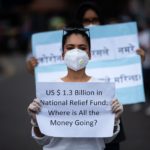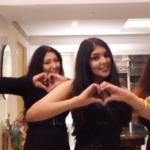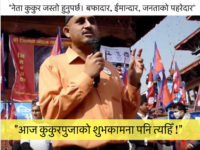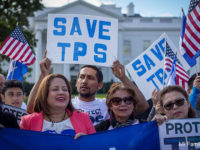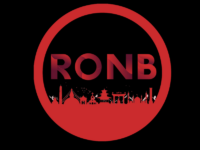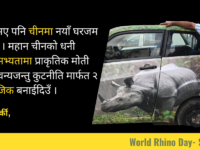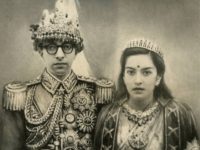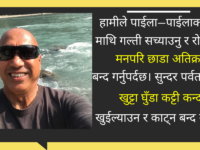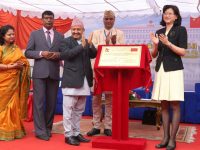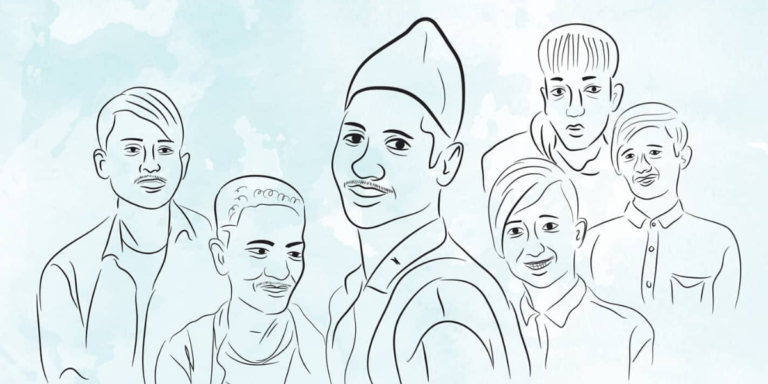By Om Tat Sat with contribution from Aruna Shrestha,
It may appear that Justice for George Floyd is just a matter of the deep-rooted American culture of racial discrimination that is prevalent in the American Justice System, through forms such as police brutality. However, this is not the only case. Racial problems by other names, are an issue in Nepal as well. Not much is being done about it, though.
In the US, it is easy to see the distinction between the two races, or other races. America is known as the “melting pot” for all the people in the world who harbor material dreams. As it is normal to have snow in the mountains, racism is a part of materialistic culture. By its very definition, only those things that are pursued and valued that can be proved by sensory perception. Our eyes definitely distinguish between colors, and values are placed according to their pleasantness that are created by social narratives. That is why White Supremacy is an American thing.
Check this out: Nepal: Youth Protest Has Started, Signs It Will Get Bigger
It may be a little harder to see the racially-motivated oppresion that is still very apparent in Nepal as well, although the more serious discrimination is driven by the caste system. Six people recently died in Jajarkot district concerning inter-caste romantic relationships. However, color discrimination and preference definitely exists in Nepal and other South Asian nations because of the colonial history.
There are even Nepali songs with lyrics hinting at preferences for fairer skin. “Ye didi poi paryo kale, Hunadeu baini ijjatai nafale,” “Aru kalo railko dhunwale, ma ta kalo chhata hajur…” are some of the songs I remember from my childhood.
This moment in the US is truly momentous. It is similar to the Civil Rights era. Many Nepalese settled in the US are also showing solidarity with the “Black Lives Matter” movement by participating in various protests, and even through posts on Facebook. This is an admirable thing to do; they can even boast of their participation in one of the most defining moments in human history. But, have these Nepalese looked under their own nails? It has been anecdotally reported that Nepalese in the US often look down upon Bhutani-Nepali. In the same vein, Nepalese are also known to use derogatory terms to indicate people of darker complexion, often to Madhesi people, such as Dhoti, Marshya, and Khali Sisi. I remember a joke told by my science teacher in school about a Newar family. Mom hears a knock on the door. She sends her daughter to check who it is. When the daughter returns, she reports, “Maa, manu makhu, marshiya kha” (Mom, it’s not a person/human, but a Madhesi/Indian).
As a #Madhesi minority in Nepal, often stereotyped as not Nepali enough (due to my darker skin tone from southern Nepal), I was pleasantly surprised to see many Nepalis supporting #BLM movement. But then I find the same Nepalis against the #Madhesi movement which was a coalition of #Madhesis and other marginalized Nepalis (e.g., “lower” caste Nepalis) for equal rights in 2015. When I politely pointed this out to one Nepali Economist recently, she blocked me from her FB account.” Khushbu Mishra
This societal preference for fairer complexions is also present in India. For instance, fairness cream has become a popular beauty product. Priyanka Chopra, the Indian Bollywood star working in the US, married to an American, was recently criticized when she posted an Instagram post boasting her support for the “Black Lives Matter” movement, in light of recent events. Many fans pointed out the hypocrisy of her actions, as she used to advertise fairness creams back home in India. The popularity of the Fair and Lovely cream proves how the colonial mentality is still ingrained in many Indian’s minds. The 200+ years of colonization by the British has instilled in their mindset that Whites are superior, resulting in many Indians accepting their inferiority, in terms of the color of their skin or the language they speak. In our society, intelligence and high class is equated with being English-like, being appreciated by the West, or making it to the West. Therefore, the impact of colonization still lingers in our day to day lives.
It is always the easiest to see the weaknesses and faults of others. Our own shortcomings are the hardest thing to accept. Just a few months ago, the East-Asian community was being targeted due to the corona pandemic. That is the same ignorant thinking that works against people that look different than you. So in the end all of these attitudes point to one big problem—ethnocentrism. I remember this distinctly when I taught public speaking classes in a university. The very first class instruction was to recognize two faulty logics: ethnocentrism and generalization. Now, it has been brought to the top of our concerns, ironically, amidst the pandemic. We are facing the most debilitating situation, in which all humans, of all races, ethnicities, religions, and backgrounds, are being equally affected by a deadly virus. Instead of pushing for the common goals of peace and prosperity for all, the shortcomings of humanity still manage to find division amongst the human race.
This is the time to acknowledge this fatal flaw in our society and in our human nature. It is the character that counts, no matter what. Our ancient texts and knowledge has taught us this; It is time we learn from it, apply it to our actions, and pass this knowledge to our youth, through the education system.
So the next time you post on social media regarding the “Black Lives Matter” movement, remember the true meaning of this statement. “Black Lives Matter” is not just about Black People in America. It encompasses all racially-motivated oppression and discrimination against all minorities, in every corner of the world. If you stand with Black People, don’t forget to stand with the Bhutan-Nepali. The Madhesi People of Nepal. Nepalese with darker skin. The Nepalese with a lower caste standing. Because if you stand for one, you must stand for all.
The writer is a graduate of Arizona State University in Political Science. He is working as a social activist and motivational speaker for students across Nepal since 2007. He also blogs at Strong Blog.
The views and opinions expressed in this article are those of the author and do not necesarily reflect the official policy or position of Nepalisite.


